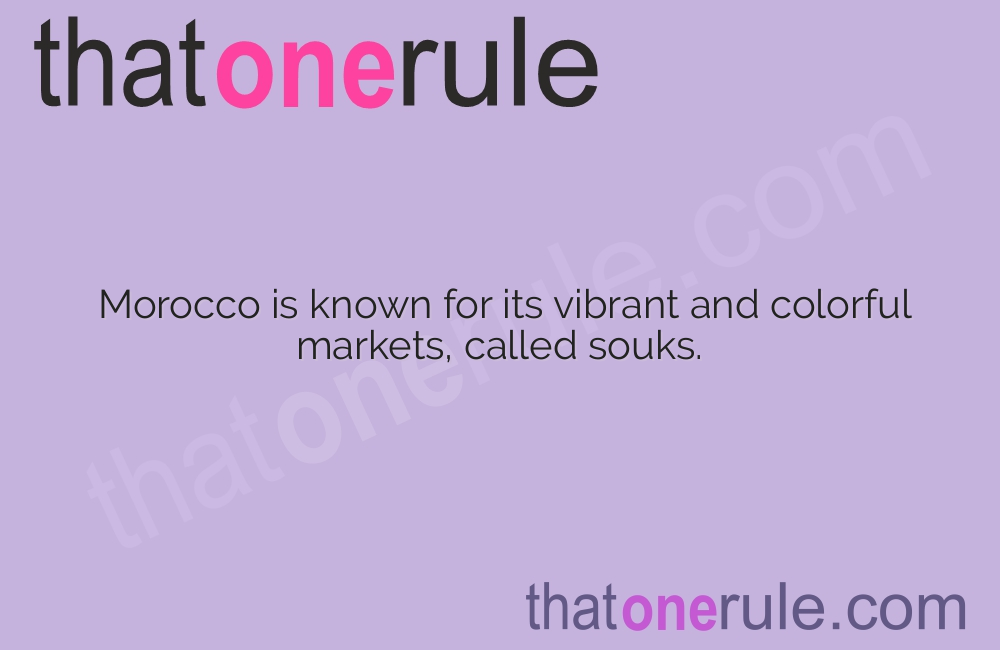Discover Fascinating Morocco – A Multifaceted Country of Rich History and Vibrant Culture

Morocco is known for its vibrant and colorful markets, called souks.
Morocco is home to the highest peak in North Africa, Mount Toubkal.
Morocco has a rich history, with traces of Roman and Islamic civilizations.
The traditional Moroccan dish, tagine, is a flavorful slow-cooked stew.
The famous blue city, Chefchaouen, is located in Morocco.
Morocco is the gateway to the Sahara Desert, providing breathtaking views and unique experiences.
Marrakech is a popular tourist destination known for its beautiful gardens and historic architecture.
In Morocco, it is customary to greet others with a handshake and a friendly kiss on the cheek.
Moroccan mint tea is a popular traditional beverage enjoyed during social gatherings.
Morocco is known for its beautiful handcrafted carpets and ceramics.
The city of Casablanca is Morocco’s largest city and a major economic hub.
Morocco has a diverse landscape, ranging from the Atlas Mountains to the Atlantic coast.
Moroccan weddings are elaborate celebrations that often last for several days.
Morocco is known for its traditional music, with instruments like the oud and the bendir being commonly used.
The ancient city of Fes is home to one of the oldest universities in the world, Al Quaraouiyine.
Moroccan architecture is characterized by intricate geometric patterns and ornate details.
The national dish of Morocco is couscous, a grain-based dish often served with vegetables and meat.
Discover Fascinating Morocco – A Multifaceted Country of Rich History and Vibrant Culture part 2
Morocco has a strong influence from Berber culture, with many Berber tribes still living in rural areas.
The coastal town of Essaouira is popular among surfers and windsurfers.
Moroccan weddings feature traditional dances, such as the lively and energetic Ahidous.
The Atlas Studios in Ouarzazate are known as the Hollywood of Morocco due to their role in various international film productions.
Morocco is home to one of the largest stretches of olive groves in the world.
The ancient city of Volubilis is a UNESCO World Heritage site known for its well-preserved Roman ruins.
Morocco is known for its vibrant festivals and celebrations, such as the Mawazine Festival and the Marrakech International Film Festival.
Moroccan cuisine is a blend of Arab, Berber, and Mediterranean influences, resulting in a unique and flavorful culinary experience.
Morocco’s rich history has influenced its art and craftsmanship, seen in intricate woodwork, metalwork, and pottery.
Marrakech’s Jardin Majorelle, with its stunning blue buildings and exotic plants, was once owned by Yves Saint Laurent.
Morocco is known for its warm hospitality and friendly locals, making it a welcoming destination for visitors.
The Sahara Desert in Morocco is home to unique wildlife, including the fennec fox and the dromedary camel.
Moroccan traditional clothing, such as the djellaba and the kaftan, showcases exquisite craftsmanship and colorful fabrics.
Morocco has a thriving film industry, attracting many international productions due to its diverse locations and skilled crews.
The traditional Moroccan hammam is a spa-like experience focused on cleansing and relaxation.
Morocco has a variety of UNESCO World Heritage sites, showcasing its rich cultural and architectural heritage.
The city of Rabat is Morocco’s capital and home to important historical landmarks, such as the Kasbah des Oudaias.
Moroccan carpets, known as kilims, are handwoven by skilled artisans using locally sourced wool.
The Todgha Gorges in the Atlas Mountains offer breathtaking views and rock-climbing opportunities.
Morocco has a unique mix of languages spoken, including Arabic, Berber dialects, and French.
Essaouira’s medina, a UNESCO World Heritage site, is a maze of narrow streets filled with art galleries and traditional shops.
Morocco is known for its distinctive traditional music genre, Gnawa music, which fuses African, Arab, and Berber influences.
The coastal town of Agadir is famous for its beautiful sandy beaches and year-round mild climate.
Morocco has a variety of natural landscapes, from lush valleys to arid deserts, making it a diverse destination for outdoor enthusiasts.
The ancient city of Meknes is known for its impressive imperial architecture, including the monumental Bab Mansour gate.
Morocco has a thriving craft industry, with artisans specializing in leatherwork, pottery, and metalwork.
The traditional Moroccan wedding ceremony, known as the Zina, is a festive and joyous occasion celebrated with music, dancing, and feasting.
Morocco’s coastal towns, such as Essaouira and Asilah, are known for their vibrant art scenes, attracting artists from around the world.

